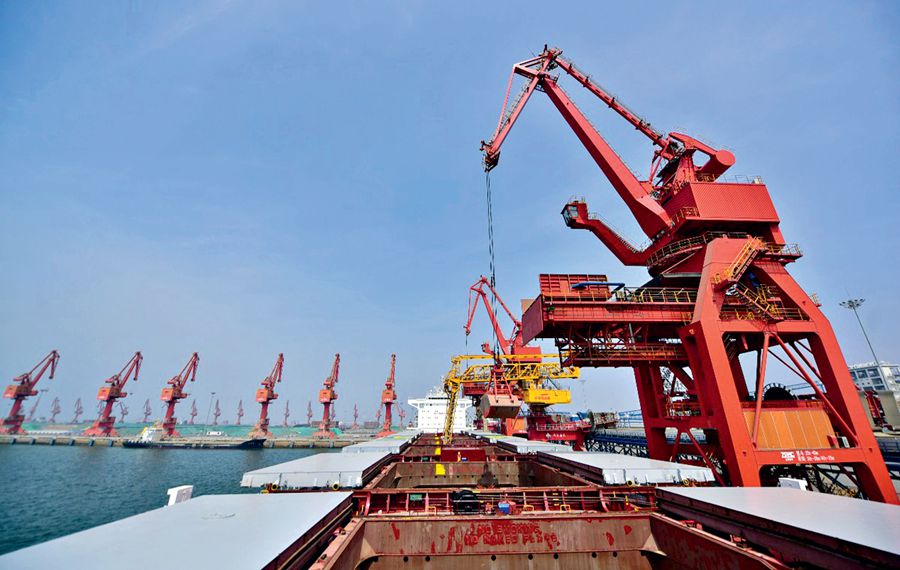GLOBALIZATION is one of the most noticeable ongoing international phenomena with the longest duration in recent decades. It is recognized to be the most striking feature marking the current era, exerting significant influence on international relations. On the one hand, the international community has demonstrated a state of “phenomenal flourishing trade, great investment facilitation, personnel mobility, and enormous technological leaps,” which as a result has progressively forged a community of a shared future interlinking individuals. On the other hand, with the increasing degree of interdependence, the threats and challenges facing all countries worldwide are becoming more common. In particular, issues such as climate change, financial crises, large-scale outbreak of infectious diseases, and cyberattacks, have become globalized, and need to be addressed through global governance. Regardless of the positive and negative effects, globalization, as the trend of our times, has become the overriding rule and inevitable route for the international community.
Roots and Sustainability of Globalization
The history of human development is the history of human beings expanding their scope of activities based on the requirements of the development of productive forces and the level of scientific and technological progress. As a result, human beings in one place gradually move from their respective places of origin and national territory, communicating and interacting with people from different places in various forms.

The G20 Osaka Summit, convened in Osaka, Japan, on June 28-29, addresses a number of issues concerning global governance.
The exact initiation point of globalization in the modern sense is still controversial and sparks debate among scholars. Some uphold the view that globalization was unfolded with the world-changing geographical discoveries in 1492 whilst others contend that the first industrial revolution in the middle and late 18th century ushered in globalization. In either case, the process is essentially the expansion of capital, commodities, and the resulting production modes and lifestyles of the whole world.
According to Karl Marx and Friedrich Engels, big industry produced world history for the first time, insofar as it made all civilized nations and every individual member of them dependent for the satisfaction of their wants on the whole world, thus destroying the former natural exclusiveness of separate nations. In other words, the modernization process based on the first Industrial Revolution saw economic globalization peaking, formed a truly global “production and consumption” paradigm and opened up a new chapter in world history based on economic globalization.
The end of the cold war removed international political barriers for globalization, making the two parallel markets give way to a unified world market. At the same time, the information technology revolution removed the technical barriers for globalization. Subsequently, free trade and open cooperation are blossoming, rendering greater cross-border and cross-regional mobility of commodities, technology, information, services, capital, and other production factors, making the world economy an interdependent and closely-linked entity. At present, a new round of technological and industrial revolution with the information technology revolution as the core is promoting globalization, which enables human beings to reside in a “global village.”
The history of globalization has proved eloquently that the driving force behind globalization is not the people’s subjective will, but scientific and technological progress and productivity development. Unless a certain country or group is capable of blocking human technological progress and productivity development, the trend of globalization will sustain itself. Any anti-globalization policies and actions will violate the objective law of human historical development, endanger the international division of the labor system and the normal operation of the global value chain, and ultimately bring unbearable losses to themselves.
Globalization: a “Double-Edged Sword”
It is undeniable that globalization is a double-edged sword having both advantages and disadvantages, and its development process has never been linear, but spirals forward, and may recur or even retrogress in some periods. The history of globalization proves that both developed and developing countries may benefit from globalization or suffer from this reality. Even the United States, the sole superpower in the world, is not exempt from this reality.
In the process of globalization, some countries have actively integrated themselves into globalization through vigorous reform and opening-up initiatives, so as to boost their stature and inch closer to the center of the international arena. However, there are also some countries that fail to adapt to the tide of globalization, widening the development gap with other nations, and plunging themselves into the notion of “victims” of globalization. Certain politically motivated parties therefore, blame economic globalization for their backwardness.
Globalization may lead to the widening of three kinds of social and economic disparities worldwide: the gap between developing and developed countries, the disparity among developing countries and divergence among developed entities, and the polarization among different strata within developing and developed countries. Globalization may also result in increased poverty, financial speculation, environmental damage, declining social welfare, rising unemployment, and loss of cultural autonomy in some countries. Some scholars have pointed out, “For those of us who live in today’s world and are being ‘coerced’ into the era of ‘accelerated globalization,’ the process of globalization brings not only pleasure, but also troubles and pains, because it will not only bring integration and harmony, but also friction and conflict.”

The French department store chain Printemps is the first French retailer to use Alipay. The picture displays a customer using Alipay to pay for her purchase in a Printemps store on November 3, 2016.
A host of problems caused by globalization primarily stem from two roots, with the first being economic globalization itself. Globalization will lead to unbalanced development among different countries and within a single nation, bringing about various economic and social problems. Second, Western neo-liberalism is misleading. Western countries have always upheld neo-liberalism as the guiding ideology of economic globalization, leveraging it to influence the process of economic globalization, thus making economic globalization the carrier of global Westernization and capitalism. They will not only realize global capitalism in economy, promote Western-style democracy in politics, but also push so-called “universal values” in culture. This is also an important reason for a myriad of disadvantages of globalization.
Currently, the global economy is handicapped by a slew of issues, such as sluggish growth, lack of development momentum, insufficient inclusiveness as well as increasing uncertainties and instability. The rivalry between multilateralism and unilateralism, open freedom and closed protection tends to be fierce. This round of globalization has been pioneered and promoted by developed countries and large transnational corporations. Simply accusing them for the problems resulting from globalization is not conducive to resolving practical problems. At the same time, dismantling and rebuilding the world economic governance mechanism dominated by them exceeding the proper limits will not result in righting a wrong. An unbiased and effective approach is to acknowledge that concepts, models, and mechanisms of globalization urgently need to be injected with fresh blood.
China Firmly Promotes Globalization
China is the biggest beneficiary, a strong promoter, and an important contributor of this round of globalization. Since the reform and opening-up, China has persisted in opening its doors to the outside world, actively integrated into the process of economic globalization, and achieved a great historical transition from self-closure to all-round opening. It has not only changed its outlook and national destiny, but also profoundly affected the process of globalization. Since its accession to the World Trade Organization, China has become the world’s largest exporter of goods, the second largest destination for foreign direct investment, the third largest foreign investor, as well as the largest trading partner of more than 120 countries and regions in the world. China proactively participates in expanding the scope of the global economy, promotes trade liberalization and facilitation, supports improvement of the global free trade system, bravely assumes the responsibility of global economic governance, seeks mutually beneficial development with global trading partners, and makes important contributions to the stability and healthy development of the global economy.

The Panamanian cargo ship “ALANTAS” loaded with 50,700 tons of soybeans from Brazil berths at the grain terminal in Panjin Port of northeast China’s Liaoning Province on June 5, 2019.
From the perspective of Marxism, socialism needs globalization. Only through combination with economic globalization can socialism develop and strengthen itself with the tide of the times, which should become an important principle of Marxism. The 100-year history of the Communist movement since the Russian Revolution shows that socialism, should it deviate from the tide of economic globalization, will reach a dead end and lose its vitality and attraction. The important experience of the success of the socialist road with Chinese characteristics is to unswervingly open up to the outside world and actively integrate into economic globalization. At the same time, we should opt for the appropriate integration path and pace according to our national conditions so as to make China a beneficiary of economic globalization.
China, as an emerging power adhering to the socialist road, shoulders the responsibilities to safeguard globalization and steadfastly promote globalization as the world is handicapped by anti-globalization currents and a few Western powers who are losing their motivation to push economic globalization. China clearly opposes protectionism and unilateralism, further enhances the level of overall opening-up, promotes economic integration among countries, jointly builds an open world economy, effectively integrates its pluses like market potential, industrial cluster competitive edge, and integrated innovation capability into the development pattern of the world economy, and promotes the optimal allocation and free flow of high-end production factors in the global context. The global governance concept championed by China as embodied by the Belt and Road Initiative and the principles of extensive consultation, joint contribution and shared benefits as well as the initiatives of a community of a shared future for mankind contributes to addressing the drawbacks of globalization, and plays a leading role in building a new globalization characterized by openness, inclusiveness, universal benefit, and win-win cooperation, and will create new opportunities for the world economy to become strong, sustainable, balanced, and inclusive.
XU JIN is a research fellow with the Institute of World Economics and Politics of the Chinese Academy of Social Sciences.


